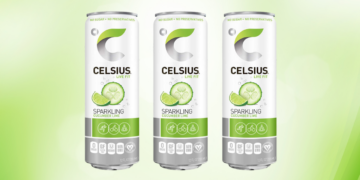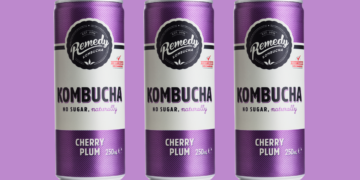Aloe Vera is renowned for its skincare benefits, but what happens if you drink it? Can you drink aloe vera juice daily?
Aloe vera juice is quite controversial. Topically, it’s renowned for its ability to soothe acne and burns. However, consuming aloe vera has raised some health concerns which leaves a lot of people hesitant to try it. That said, Aloe Vera juice is a refreshing green juice. It might not be as trendy as the likes of celery water, but we would not knock it just yet…
It’s recommended to consume between 3 to 6 tablespoons daily. Consuming a small dose of pure aloe vera juice may help to clear skin and ease acid reflux as it is a healthy source of nutrients. Be cautious of store-bought varieties as they are watered down, and packed with added sugars.
- What is Aloe Juice?
- Is Aloe Vera Juice Safe To Drink?
- What are the benefits of aloe vera juice?
- What happens when you drink aloe vera juice every day?
- What is the best time of day to drink aloe vera juice?
- What are the side effects of drinking aloe vera juice?
- How much aloe vera juice should I drink a day for acid reflux?
- How much aloe vera juice to drink daily for weight loss?
- How much aloe vera juice to drink daily for constipation?
- How much aloe vera juice to drink daily for hair growth?
- How much aloe vera juice to drink daily for clear skin?
- The Bottom Line
What is Aloe Juice?
Aloe vera juice is a juice made from the gel-like inside of the aloe vera plant. Although it may be blended with other ingredients, you’ll typically find pure aloe vera juice in health stores. It’s typically smooth, but sometimes it will contain small bits of also vera gel. Always read the ingredients; some aloe drinks do not actually contain much aloe vera.
Although there are lots of species of the aloe plant, this juice is typically only made from aloe vera gel. Many other types of aloe may not be safe for consumption.
Is Aloe Vera Juice Safe To Drink?
Topically, aloe vera is hailed for its ability to soothe skin. However, when it comes to ingesting aloe vera juice, there are a few things to keep find mind. Consult a medical professional before drinking aloe vera juice in a bid to ease symptoms or even treat any medical condition.
Aloe vera juice is generally safe if made from the gel. Commerical aloe vera juice is typically only made from the aloe vera gel – and rarely, if ever, the whole leaf or the latex. The aloe leaf itself generally seems to be safe for consumption as long as it’s clean and fresh. However the latex – which is a yellow substance between the leaf and the aloe gel – is not something you should consume often.
Research has found that ingesting this plant in large doses over a prolonged period of time can cause kidney failure and diarrhea. It has also been dubbed a carcinogen. However, these results were noted in animal studies so more research is needed on how it may impact human health. Accidently consuming the parts of the whole aloe vera plant or the latex ones does not seem to be a cause of concern, but doing so on a regular basis is not advised.
It should go without saying, but if you are making aloe vera juice yourself, only make it with the gel from clean fresh aloe vera leaves. Commerical aloe vera juice should be made without latex and with good food hygiene in mind. While many cosmetic aloe vera products seem natural enough, they’re likely to have preservatives and other ingredients that are not intended for human consumption. Worst of all, many do not contain aloe at all and instead just contain a clear aloe-like gel.
If you’re pregnant or breastfeeding, you should probably skip aloe vera juice for the being.
What are the benefits of aloe vera juice?
Aloe vera juice is hydrating and refreshing. Given that aloe vera naturally has high water content, it is a healthy way to stay hydrated if you struggle to drink water.
Pure aloe vera juice made only from the gel of the plant contains only 2.4 calories per 100 ml, 0.2 grams of fat, and 0.1 grams of sugar. It’s a good source of antioxidants and vitamin C. Aloe vera gel is also a source of vitamin A, E, and some B vitamins like vitamin B12, folic acid, and choline. It will also contain some minerals like calcium, chromium, copper, selenium, magnesium, manganese, potassium, sodium, and zinc. Consuming a wide range of vitamins and minerals is important for maintaining overall good health and a strong immune system.
However, generally, a lot of the aloe vera juice products found in stores have lots of added sugar and are heavily watered down. So, many potential health benefits will effectively be canceled out. For example, aloe vera is believed to have anti-inflammatory properties, but added sugar has been linked with inflammation.
For comparison, an 8oz serving of Aloe Vera King juice contains 19 grams of sugar.
Aloe vera can even be good for oral health. Studies found that aloe vera can help reduce the build-up of dental plaque. This is why it’s not unheard of to see aloe vera as a toothpaste ingredient! Again, aloe vera juice containing added sugars will not have this effect. This does not mean that aloe vera juice is a substitute for toothpaste or mouth wash.
Studies have found that aloe vera can even improve memory and mood. Keep in mind that these studies were on mice. These kinds of trials do not always yield the exact same results in humans.
What happens when you drink aloe vera juice every day?
You can drink aloe vera juice every day as long as it does not contain any latex. It’s also not recommended to drink large amounts of pure aloe vera juice every day. You do not need to consume much aloe vera juice for it to be worthwhile.
People typically do not drink a lot of pure aloe vera juice. It can taste quite grassy. Plus. some people with digestive issues can find it irritates their stomach or leaves them feeling nauseous.
It’s recommended to consume between 3 to 6 tablespoons of pure aloe vera juice per day -on an empty stomach. It can be added to smoothies or another juice if you don’t like to taste it. You can have this once a day, or spread the dose out.
A commercial aloe vera juice that has been watered down can be consumed in larger doses. However, drinking aloe vera juice with high amounts of sugar may cancel out any potential health benefits. If you’re drinking these products because you enjoy the taste, then go ahead! Keep in mind that they may not be as potent as pure aloe vera juice if you are interested in this plant for health reasons.
What is the best time of day to drink aloe vera juice?
It is often recommended to drink aloe vera in the morning on an empty stomach before having breakfast. However, there does not appear to be any research behind why this is the most optimal time to reap any health benefits.
As long as you are consistent, you should still reap the benefits associated with consuming aloe vera juice.
What are the side effects of drinking aloe vera juice?
The latex in aloe vera leaves can have a laxative effect. While the aloin compound in aloe vera does not seem to be the same as an over-the-counter laxative, it should be noted that laxatives can cause dehydration due to the loss of fluid and electrolytes.
Some people with Chron’s and other issues impacting the digestive system can find aloe vera juice to be hit or miss. Some people find it beneficial, while others with digestive health issues feel it exacerbates things. This is because the presence of latex could cause diarrhea and stomach upset. In this instance, it is best to make aloe vera juice yourself so you can guarantee that there is no latex in it.
In some instances, aloe vera juice has been associated with low potassium levels. If you’re unsure about whether aloe vera juice is safe or suitable for you and your specific health needs, speak to your doctor first.
How much aloe vera juice should I drink a day for acid reflux?
Aloe vera may help to alleviate acid reflux. A study found that participants with GERD who took aloe vera gel had reduced heartburn, food regurgitation, flatulence, belching, dysphagia, nausea, vomiting, and acid regurgitation.
If you are consuming aloe vera juice for acid reflux, you still don’t need to take more than 6 tablespoons per day.
How much aloe vera juice to drink daily for weight loss?
Although Aloe vera is often found in weight loss products, the research supporting its effectiveness is somewhat limited. If weight loss is your goal, you achieve it by eating a healthy diet and leading an active lifestyle. If you are going to drink aloe vera juice for its other supported health benefits, be sure to only opt for pure aloe vera juice. You do not need to have this in excessive amounts, the recommended 3-6 tablespoons per day guideline should be fine.
Aloe vera juice can be healthy, a study published in the journal of traditional and complementary medicine argued that aloe vera gel can reduce glucose intolerance induced by obesity because of its anti-inflammatory properties. Due to this effect, it is believed that aloe vera juice or gel can indirectly help support healthy body weight, body fat, and fasting blood glucose levels in participants with prediabetes.
How much aloe vera juice to drink daily for constipation?
The research on whether aloe vera juice can help with constipation is quite limited.
A study on rats found that aloe vera did help to alleviate stress-induced IBS. Studies on human participants are conflicting about whether there are any substantial benefits or not. That said, the anti-inflammatory properties of aloe vera can theoretically help with gastritis. But there has been no solid research backing this up.
If you still want to try aloe vera for constipation, you can try having 3 to 6 tablespoons of pure aloe vera juice per day and see how you feel. If it upsets your stomach, then it’s probably not for you. Be sure to consult a medical professional attempting any supplements to ease symptoms of health issues.
How much aloe vera juice to drink daily for hair growth?
Although Aloe vera is a common ingredient in hair masks, the research on whether drinking aloe vera juice can help with hair growth is minimal.
That said, aloe vera might address iron deficiency that can result in hair loss. Vitamin C helps the body to absorb this mineral, and as aloe vera juice is high in vitamin C it may help maintain healthy hair. Aloe vera juice is not a magical remedy but just a convenient way to add more vitamins and minerals to your diet – you could as well supplement your mineral and vitamins in another way.
Again, if you are going to consume aloe vera juice there is no need to consume more than six tablespoons per day.
How much aloe vera juice to drink daily for clear skin?
Aloe vera is a common ingredient in skincare products. This is because it can soothe inflammation – like acne or sunburn. So, it makes sense to wonder if consuming aloe vera juice can also be good for your skin.
Aloe vera juice is a decent source of vitamin C. This vitamin is also popular in topical skincare products.
Research has suggested that those who consume vitamin C are less likely to experience dry skin. It has also been associated with better skin appearance and a decrease in the appearance of wrinkles. It may also offer some photoprotection from sun damage (which can cause age spots and premature wrinkles). However, it should be stressed that vitamin C (whether ingested or used topically) does not protect from UV damage and is not a substitute for sunscreen.
Aloe vera juice is also a source of antioxidants. Oxidative stress can also cause premature aging (and a host of health issues). Consuming antioxidants is believed to protect against free radical damage.
You should not need to consume more than 3 to 6 tablespoons of aloe vera juice per day for your skin.
The Bottom Line
There are lots of benefits to drinking aloe vera juice. However, with many aloe drinks on the market containing high amounts of sugar, if you want to reap any of the potential health benefits, you need to drink juice made from the gel of the aloe vera plant without anything else.
Be very careful when making your own aloe vera juice as the latex can cause health complications with prolonged use.







